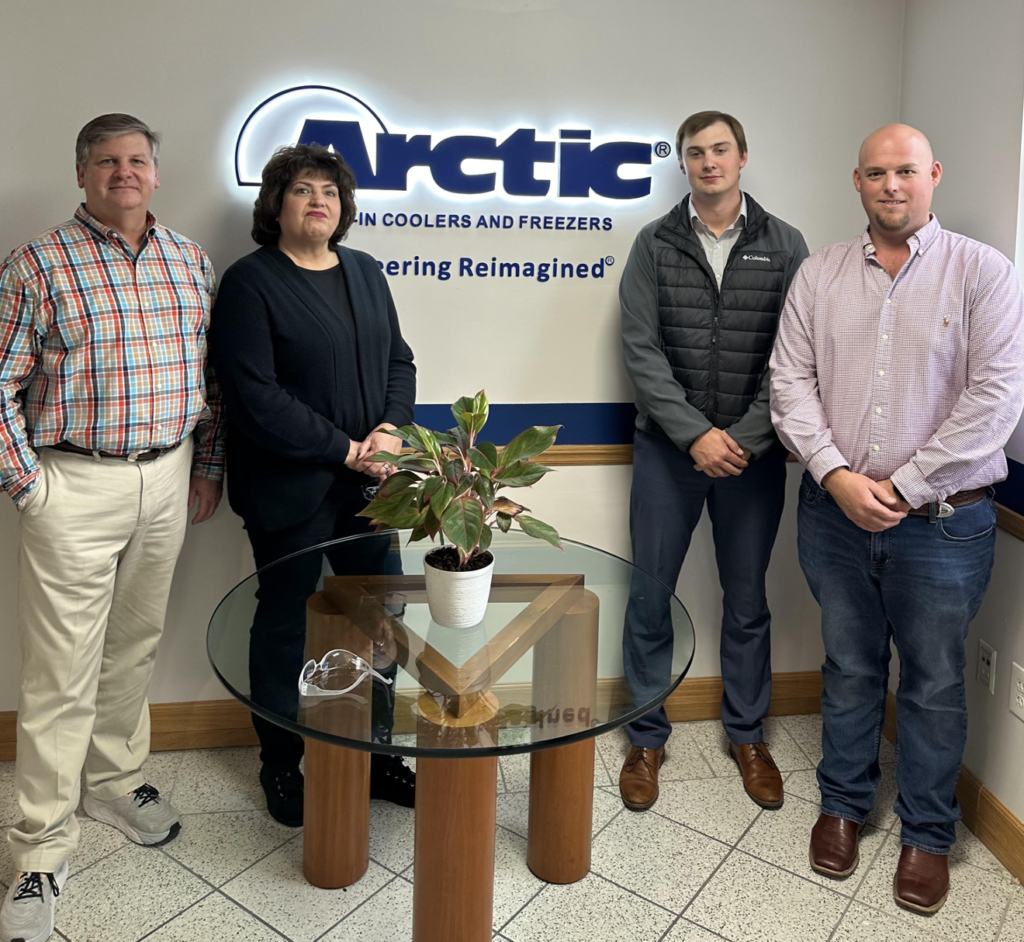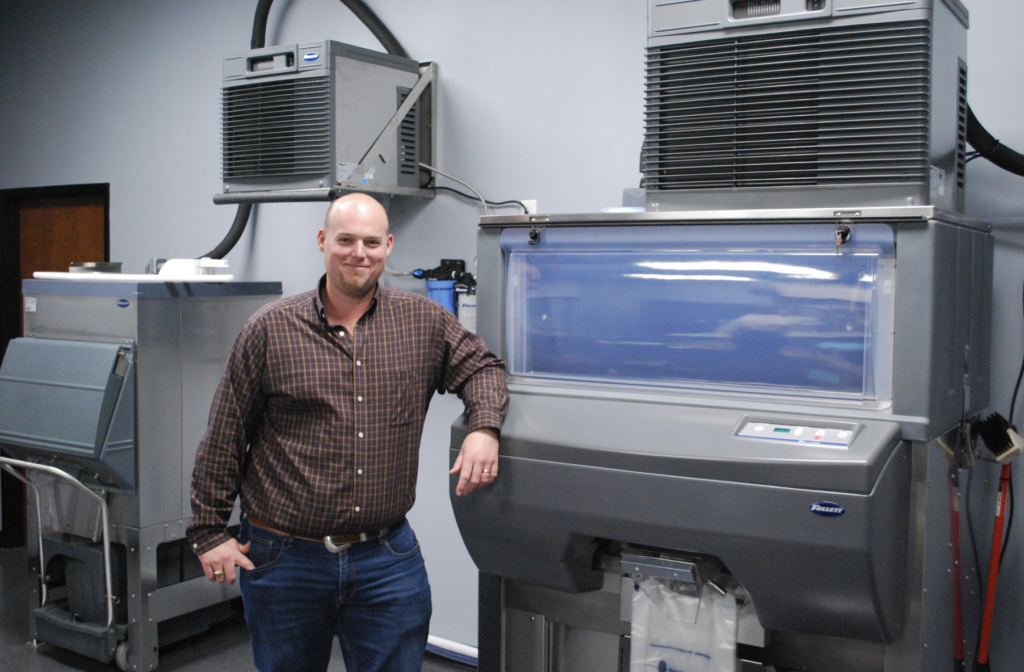We met with our new partner, Trey Kallman of PROLOGIC Food Equipment Group to discuss the history of their thriving business and why they trust Arctic for their cooling needs.
It’s great to meet you. If you wouldn’t mind, please tell us about PROLOGIC, the team, and your approach to being a Manufacturing Representative.
Trey: “PROLOGIC was founded in 2011. We founded the company with one product line and that was a walk-in cooler line. We’re passionate about walk-in coolers, that’s what we love to sell. We feel like we’re a refrigeration-oriented group. Ryan joined us seven years ago and he picked up the passion for selling walk-in coolers and did well in that arena. We have two other sales reps, one over in Houston, Paula Clark, and then our other South Texas rep, Blake Ray. They’re both excited about the opportunity to partner with Arctic, as well, and share in that passion for walk-in coolers. We feel like Arctic as a team shares a lot of the same values that we do and that’s going to help us be successful. We feel like we’re going to be able to offer Arctic the support and sales time that they deserve, so we were excited about the opportunity.”
What is the PROLOGIC strategy for 2024? How has your team and approach changed post-Covid?
“The strategy hasn’t changed, it’s still the basics. We live in a relationship-driven world and people want to do business with people they like. The barriers that have been added are nobody goes to freaking work anymore and it’s hard to get in front of people. That’s what’s changed. However, it goes back to those relationships you’ve had forever, and there are still those lists of people you can pick up the phone and get in front of any time, any day because they like you. Our strategy is to do exactly that. Be out hitting the streets, be in front of people, build new relationships every day, and continue to grow the relationships we have. When we don’t have a relationship, our job is to identify the relationship we want to have and go figure out how to get in front of them and create a relationship.
We don’t have products that are just sold out of the box if you will. That requires us to get out in the field, get out in front of customers, whether it’s assisting with site surveys, doing field measurements, that sort of thing. We’ve been doing that all along, even through Covid. That never changed for us. There were some limitations with that, but we never sat behind the computer and tried to sell our products. We stayed out in the field and did our job.”
Walk-in coolers and freezers are often the largest purchase on a project. How does it differ in the design and sales cycle from a hood or dishwasher?
There’s not a lot of differences. You know, those three products that you just mentioned are all purchased ahead of time. Most often they require the most utility connections. They require installation before walls are completed, so those three lines are very similar. We’re always on the front end of the project unless it’s an existing business.
It’s always on the front end of the project. All three of those are similar, but how it’s different is it takes forethought, planning, and creativity to design that. You put a walk-in cooler or a hood in a spot and two months later the customer may not like where it is. If it doesn’t work, you’re not able to relocate that cooler or freezer. You know, you can go buy a bunch of forks and say, “Hey, I don’t like these forks, go buy more forks.” You can’t just move a hood or a walk-in. You need people who know what they’re doing and have seen it and done this to stop and say, “Hey, that’s not a good idea. You can’t put it here. The door is not going to open or your door is opening into a walkway.” Those are the things that we think of beforehand, which make a difference and we know what to look for and we know what to watch out for.”
What would you like your design team to see in Walk-ins from a technology perspective that would speak to the end user?
“You know, I think what we’re seeing here is connectivity. Remote access and technology will allow something to monitor 20+ schools as well as look at the performance of his walk-in coolers. I think it’s become very important to offer some sort of connectivity to watch out for failures and rises in temperatures that would affect the discarding of food products. I think if we can mitigate that loss, I think that’s a huge offering to designers and end users alike.”
I think the overwhelming sentiment from Arctic is that we’re just incredibly happy to have you join our team for 2024 and beyond. Why choose to work with Arctic and why now?
Trey: “We parted ways with our previous walk-in cooler manufacturer back in 2021 for various reasons. We stepped back and waited to see how we were going to come out of these supply chain issues that the country saw. We wanted to see who was going to survive. We wanted to see who was going to continue to manufacture a quality product. So we didn’t get in a hurry to go replace our walk-in cooler line. We visited Arctic at the last NAFEM show and talked in depth with Scott Carter about the features and benefits of Arctic’s product. From their wall panels to their floor panels, to their refrigeration products. We felt really good about what we heard. It’s a foamed-in-place urethane box. I’ve always been a believer in foamed-in-place urethane as opposed to some of the other types of styrene boxes. After that visit, we just kind of kept the conversations going over the last several months, and then we came to a point where there was an opportunity and we truly felt like the Arctic was a great fit for our company and what we believe and the type of product we want to sell every day.”
What is the PROLOGIC team seeing as far as emerging trends in the respective industry?
“The most consistent theme I would see is people want connectivity. Whether it be an oven, a walk-in, or whatever. They want the data, they want to be able to track things, watch things, and know what’s happening. You know, on some of these ovens now the chef can take a vacation and sit there and watch on his phone what the people are doing in the restaurant, and he can say, “Oh man y’all are screwing my recipes up!” It’s crazy. People like that stuff. I would say that’s probably the biggest emerging trend. You had a wave of people going back years ago going cheap, driving down quality, trying to create profitability. Now as things are getting more expensive and people are having to pay the higher prices anyways, you’re seeing a trend of people saying, “Fine, if we’re going to pay top dollar for something, we’re going to make sure we want to get top dollar quality.” People aren’t standing for cheap quality products anymore.”
What about the Arctic customer-first approach and product alignment with PROLOGIC? How can we expand our efforts to be the industry leader for the customer?
“What’s just as important as selling the product is supporting the product after the sale. I like to use the comparison of a car dealership. You know, you could go buy a vehicle and have the greatest car salesman ever and have the best experience you’ve ever had. When that car has a problem or breaks down, if you take that car back to that dealership and their service department doesn’t take care of you and treat you like dirt. Are you going to go back and buy another car from that same dealership, even though you loved your salesman on the front end? Probably not. There has to be equal support on the sales side and then again on the service side. From a customer standpoint, that’s got to be solid. You gotta support the sale after the fact.”
Please leave us with 30 words or less describing PROLOGIC Food Equipment Group.
“PROLOGIC’s goal and mission statement is exactly its name. We want to be the logical choice. We want to be the professional, logical choice for representation in the Texas and Oklahoma markets.”
Thank you, Trey, for taking the time to sit down and chat with us!



